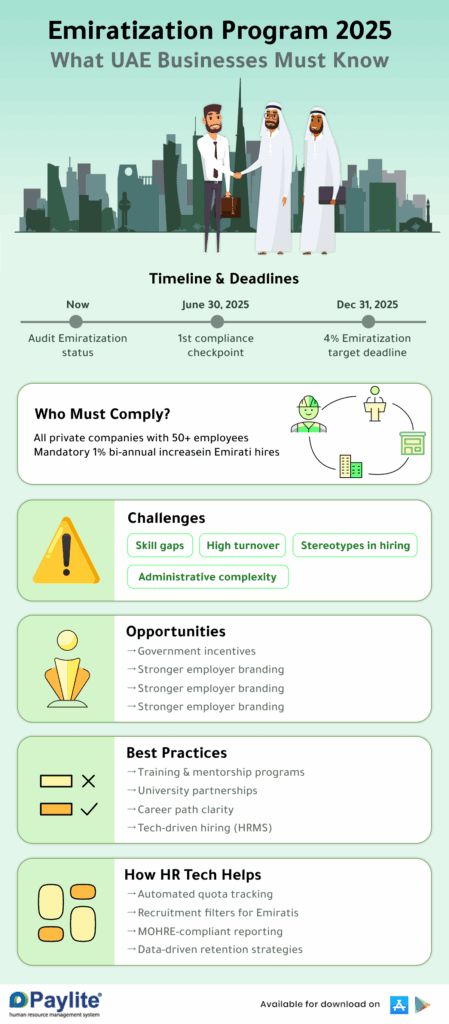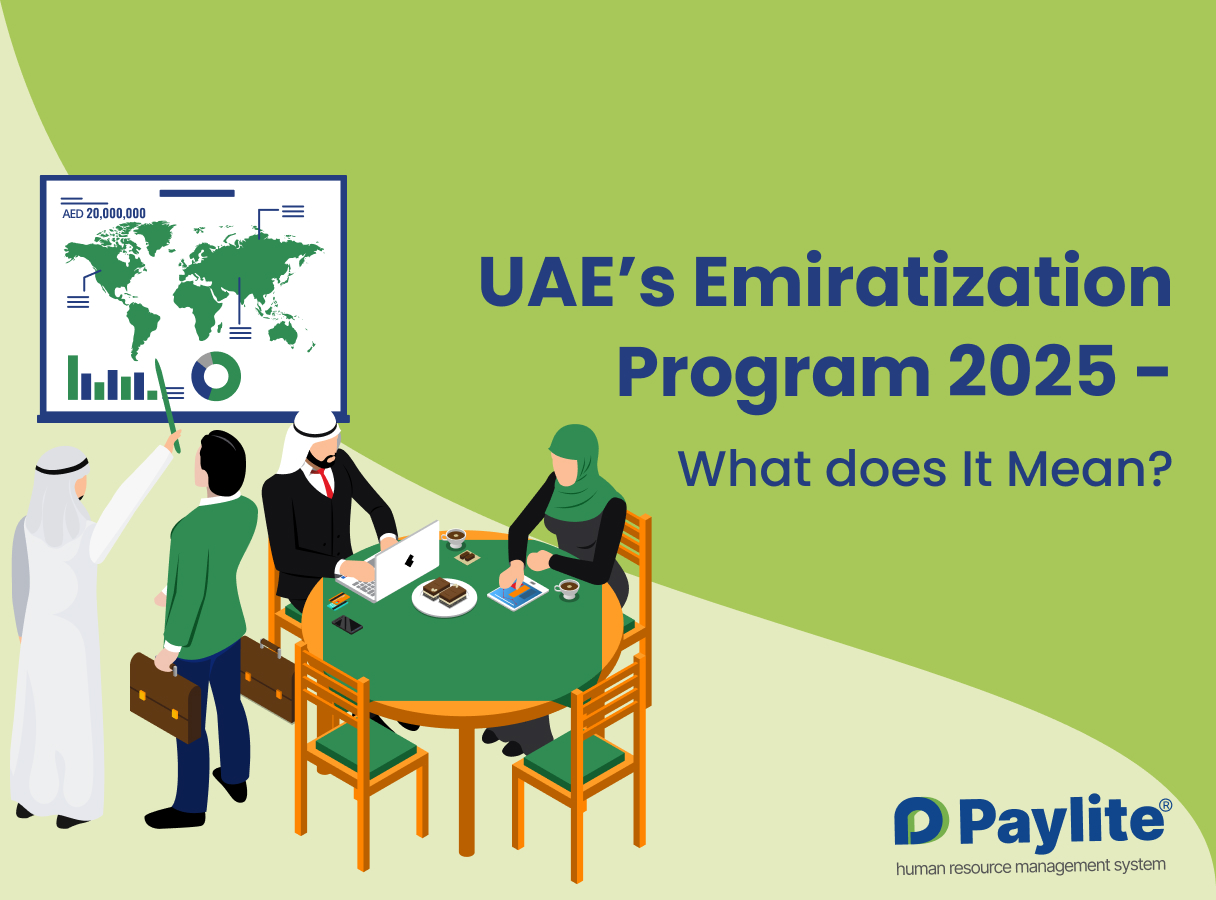The UAE has long been a magnet for international talent, offering a dynamic and diverse work environment. However, in recent years, the government has increasingly focused on enhancing local participation in the private sector. The Emiratization Program 2025 represents the most ambitious phase yet of this national workforce strategy. But what exactly does it mean for businesses, HR professionals, and job seekers in the region?
Let’s explore the implications of Emiratization in the UAE, the latest policy updates for 2025, key challenges, opportunities, and how organizations can ensure Emiratization compliance with the right tools like Paylite HRMS in Dubai, UAE.
What Is Emiratization?
Emiratization refers to the UAE government’s initiative to increase the number of Emirati nationals employed in the private sector. While localization in the public sector has already reached high levels, the private sector has remained largely reliant on expatriate talent. The Emiratization policy aims to address this imbalance by mandating companies to meet specific national employment quotas.
This is not just a regulatory move but part of a broader vision to create a sustainable, skilled national workforce, reduce dependence on foreign labor, and enhance economic resilience.
Emiratization Program 2025: The Latest Updates
According to the Ministry of Human Resources and Emiratization (MOHRE), companies must meet half-yearly Emiratization targets. The first key deadline for 2025 is June 30, by which private sector companies are expected to achieve the Emiratization targets set for the first half of the year.
Key Requirements:
- All private companies with 50 or more employees must increase their Emirati workforce by 1% every 6 months.
- By the end of 2025, companies must achieve an overall 4% Emiratization rate.
- Non-compliance will result in financial penalties that will escalate based on the degree of violation.
These regulations are part of a growing focus on localization in the workplace, with the UAE pushing to integrate its citizens more deeply into economic growth engines.

Why Emiratization Matters in 2025
1. Strategic National Vision
Emiratization is a pillar of the UAE Centennial 2071 and Vision 2030 initiatives. Encouraging private sector participation among Emiratis is vital to building a knowledge-based economy.
2. Diverse Workforce Development
Employing Emiratis in varied industries promotes greater cultural representation, long-term employee retention, and skill transfer.
3. Economic Sustainability
A strong national workforce enhances the UAE’s capacity to weather global economic changes by reducing over-dependence on expatriate labor.
Key Challenges in Emiratization Compliance
Despite good intentions, achieving Emiratization compliance is not without challenges:
1. Skills Gap
Many companies struggle to find Emirati candidates with the technical expertise or experience required for specific roles, particularly in specialized sectors.
2. Retention Issues
High turnover rates among national hires have been a persistent problem. This often stems from a mismatch between employee expectations and company culture.
3. Perception Gap
Some employers remain hesitant due to stereotypes or concerns about productivity and commitment, which must be addressed through better onboarding and workforce integration strategies.
4. Administrative Burden
Tracking quotas, documenting compliance, and reporting to MOHRE can be time-consuming for HR departments without the right technology infrastructure.
Opportunities for UAE Nationals
The Emiratization Program 2025 presents a transformative opportunity for UAE Nationals to play a greater role in the nation’s economic growth. As more private companies strive to meet their Emiratization compliance targets, Emiratis will benefit from increased access to employment opportunities across diverse industries.
With tailored training, mentorship, and development programs, young Emiratis can acquire the skills needed to succeed in high-demand sectors. The emphasis on localization in the workplace also means more inclusive work environments that celebrate national identity and offer clear career progression paths.
As a result, Emiratis are now in a stronger position than ever to shape the future of the UAE’s private sector through active participation, leadership, and innovation.
Opportunities for the Private Sector
While the road to compliance can be complex, the Emiratization Program 2025 opens up numerous opportunities:
1. Access to Incentives
Companies that exceed Emiratization targets are eligible for a range of government incentives, including:
- Discounts on service fees
- Priority in government contracts
- Recognition and awards
2. Employer Branding
Firms that actively support localization in the workplace enhance their reputation and appeal to both customers and potential employees.
3. Long-Term Talent Development
By investing in Emirati talent now, organizations can develop a loyal, high-performing workforce aligned with UAE’s long-term goals.
How HR Technology Enables Emiratization Success
To successfully implement and track progress on Emiratization in the UAE, HR teams must modernize their approach to workforce planning. This is where solutions like Paylite HRMS come in.
Benefits of Using Paylite HRMS in Dubai, UAE
- Automated Quota Tracking: Stay on top of MOHRE targets with real-time dashboards showing Emiratization progress.
- Smart Recruitment Tools: Use filters to prioritize Emirati candidates during job postings.
- Onboarding and Retention Analytics: Identify common drop-off points and develop tailored strategies for better engagement.
- Custom Reporting: Generate compliant reports for authorities with a few clicks.
- Data-Driven Workforce Management: Plan future hiring needs based on historical trends and performance data.
By using intelligent HR software in Dubai, businesses can turn compliance from a burden into a strategic advantage.
Best Practices for Emiratization in the Workplace
Here are some proven strategies that help organizations align with Emiratization compliance goals:
1. Develop Internal Training Programs
Design and implement structured training initiatives focused on bridging skill gaps and providing Emiratis with real-world exposure. Use job shadowing, mentorships, and rotational programs to build competency.
2. Foster Inclusive Culture
Create a workplace culture that values diversity and respects cultural sensitivities. Encourage team-building activities, cross-functional collaboration, and leadership representation from Emiratis to build trust and belonging.
3. Offer Career Progression Paths
Ensure Emirati employees have access to clearly defined growth trajectories. Provide regular performance reviews, goal-setting sessions, and personalized development plans to support long-term retention.
4. Collaborate with Universities and Government Portals
Build strategic partnerships with local universities, vocational training centers, and platforms like Nafis to create a consistent pipeline of qualified Emirati candidates.
5. Leverage Technology for Workforce Management
Utilize the robust Paylite HRMS in Dubai, UAE to streamline hiring, onboarding, compliance reporting, and employee development initiatives.

What Companies Should Do Before June 30, 2025
With the deadline approaching fast, here are the immediate steps businesses should take:
- Audit Current Emiratization Levels: Analyze your workforce data to assess current Emirati representation against the required 1% bi-annual growth.
- Implement or Upgrade HR Software in Dubai: Equip your HR department with advanced tools like Paylite HRMS to track Emirati hires, generate MOHRE-compliant reports, and manage localization strategies efficiently.
- Recruit Strategically and Proactively: Leverage local recruitment platforms, conduct Emirati-focused job fairs, and promote openings through government-endorsed channels.
- Engage Internal Stakeholders: Conduct workshops for department heads and hiring managers to align them with Emiratization goals and build internal accountability.
- Communicate Value to New Hires: Ensure Emirati candidates understand the organization’s long-term vision and how their roles contribute to national goals, increasing their engagement and retention.
Conclusion
The Emiratization Program 2025 is more than a compliance challenge — it’s a national transformation agenda with far-reaching implications for the private sector. Companies that align with this vision not only avoid penalties but also position themselves as partners in the UAE’s journey toward a more inclusive, sustainable, and self-reliant economy.
With tools like Paylite HRMS in Dubai, UAE, organizations can efficiently navigate Emiratization demands, optimize workforce management, and contribute meaningfully to national development.In this new era of localization in the workplace, smart businesses will lead not just by following rules but by building the future of work, together with the people who call the UAE home.

